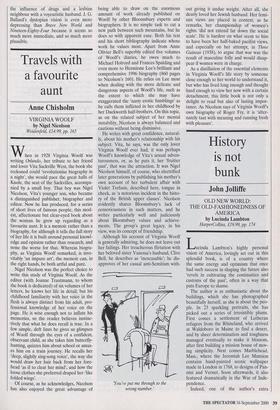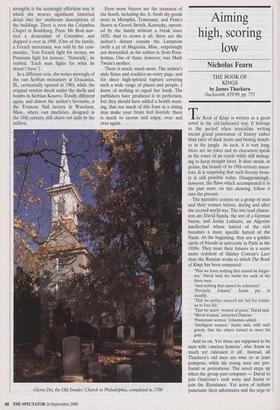History is not bunk
John Jolliffe
OLD NEW WORLD: THE OLD-FASHIONEDNESS OF AMERICA by Lucinda Lambton HatperCollins, £19.99, pp. 174 Lcinda Lambton's highly personal vision of America, lovingly set out in this splendid book, is of a country where the same energy and optimism that once had such success in shaping the future also `revels in cultivating the continuities and customs of the past', often in a way that puts Europe to shame.
The author is as enthusiastic about the buildings, which she has photographed beautifully herself, as she is about the peo- ple. In 23 sparkling portraits, she has picked out a series of irresistible plums. First comes a settlement of Lutheran refugees from the Rhineland, who arrived at Waldoboro in Maine to find a desert, and by sheer determination and toughness managed eventually to make it blossom, after first building a mission house of mov- ing simplicity. Next comes Marblehead, Mass., where the Jeremiah Lee Mansion contains hand-painted scenic wallpaper made in London in 1768, to designs of Pan- nini and Vernet. Soon afterwards, it also featured dramatically in the War of Inde- pendence.
Indeed, one of the author's extra strengths is the seemingly effortless way in which she weaves significant historical detail into her exuberant descriptions of the buildings. There is even the Columbus Chapel at Boalsburg, Penn: Mr Boal mar- ried a descendant of Columbus and shipped it over in 1908. (One of the family, a French mercenary, was told by his com- mander, 'You French fight for money, we Prussians fight for honour."Naturally', he replied. 'Each man fights for what he doesn't have.') In a different vein, she writes movingly of the vast Serbian monastery at Gracanica, Ill., cerrnonially opened in 1984, while the original version shook under the shells and bombs in Serbian Kosovo. Totally different again, and almost the author's favourite, is the Tremont Nail factory in Wareham, Mass., where vast machines, designed in the 18th century, still churn out nails by the million. Even more bizarre are the treasures of the South, including the A. Swab dry goods store in Memphis, Tennessee, and Penn's Stores at Gravel Switch, Kentucky, operat- ed by the family without a break since 1850. And to crown it all, there are the author's distant cousins the Lamptons (with a p) of Magnolia, Miss., surprisingly not descended, as the author is, from Poca- hontas. One of them, however, was Mark Twain's mother.
There is much, much more. The author's style fizzes and crackles on every page, and for sheer high-spirited rapture covering such a wide range of places and people, I know of nothing to equal her book. The publishers have produced it to perfection, but they should have added a health warn- ing, that too much of this feast at a sitting may make your brain feel liverish: there is much to savour and enjoy, over and over again.
Gloria Dei, the Old Swedes' Church in Philadelphia, completed in 1700



































































 Previous page
Previous page